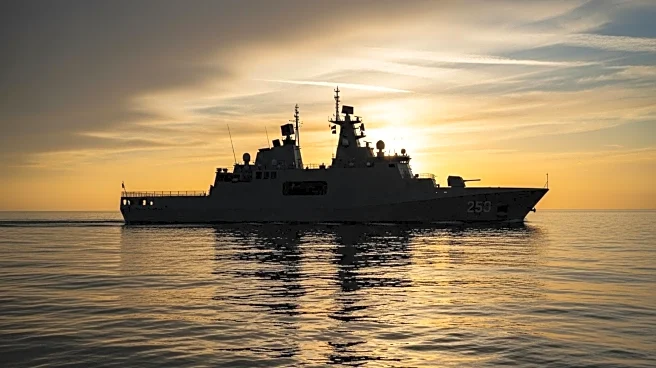What's Happening?
The Trump administration is facing scrutiny over the legality of a military strike that resulted in the deaths of 11 alleged drug smugglers in the Caribbean. The strike targeted a speedboat believed to be operated by members of the Venezuelan criminal gang Tren de Aragua, which the U.S. has designated as a terrorist organization. Legal experts and congressional sources have raised concerns about the justification for the strike, as the administration has yet to provide a clear legal rationale. The Defense Department canceled scheduled briefings with key congressional committees, leaving lawmakers without answers regarding the military unit involved, the type of munitions used, and the intelligence that led to the decision.
Why It's Important?
The incident raises significant questions about the use of military force and the legal frameworks governing such actions. The designation of Tren de Aragua as a terrorist organization does not automatically authorize lethal force, and the administration's reliance on Article II powers is being challenged. This situation highlights the ongoing debate over the president's authority to conduct military operations without explicit congressional approval. The outcome of this debate could have implications for U.S. foreign policy and military engagement, particularly in regions where criminal organizations are prevalent. It also underscores the need for transparency and accountability in military operations to ensure compliance with both domestic and international law.
What's Next?
Congressional leaders are likely to continue pressing the administration for a detailed legal justification for the strike. The lack of clarity and the potential for further military operations, as indicated by President Trump, suggest that this issue will remain a point of contention. Lawmakers may seek to limit the president's military authority or demand more stringent oversight of such actions. Additionally, international reactions could influence U.S. diplomatic relations, particularly with countries in the Caribbean and Latin America.
Beyond the Headlines
The strike raises ethical and legal questions about the classification of criminal organizations as military targets. Traditionally, drug smugglers have been treated as criminals entitled to due process, not as enemy combatants. The administration's approach could set a precedent for future military actions against non-state actors, potentially blurring the lines between law enforcement and military operations. This development may also impact U.S. relations with Venezuela and other countries in the region, as well as international perceptions of U.S. military policy.











